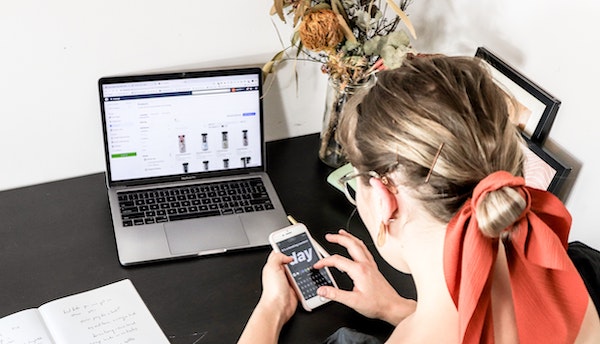In May 2020, Facebook launched Facebook Shops that makes the shopping experience even more seamless and benefits especially small businesses. People can shop easily from your Facebook Page, your Instagram profile, or by swiping up from your Instagram Stories. With full-screen photos and customizable collections, you can build a brand identity and inspire product discovery on Facebook and Instagram.
Facebook is rolling out this new feature to businesses who currently sell products on Facebook or Instagram or both and will send them an email and a notification when the new shop is ready. To prepare your business for success this is a great time to connect your online store to your Facebook and Instagram accounts and start selling products on social media.
How to create a Facebook shop
1. Check that your business qualifies for Facebook Shops
To create a Facebook shop you must sell physical items, agree with Facebook Merchant Terms, have a valid US bank account, and have a Tax identification Number.
2. Make sure you have the right template on your Facebook page
Go to your Facebook page on your computer and click on the “Shop” tab on the left side of the page. If you don’t see this tab you need to change your page template. To change the template, click on the “settings” on the top right corner of the page and then choose “templates and tabs” from the options on the left side. When you click on the “templates and tabs” you see your current template at the top. Click on “edit” and scroll down to select “shopping.” Then click on “apply template” and “ok.” Go back to your homepage and now you should be able to see “Shop” as one of the tabs on the left side of the page.
3. Create your Commerce Account
Click on the “Shop” tab on the left side of your Facebook page and then click on the “Go to Commerce Manager” button. You’ll be taken to the Commerce Manager, Facebook’s commerce order management tool. On that page you’ll need to set up your business information, products and settings, and payouts.
4. Set up your business information
Under “Business Information” click on the “set up” button. First, insert the public name of your business. Next, connect your commerce account to your existing Facebook page. And lastly, connect your commerce account to a Business Manager Account. If you don’t already have one, click “Create a Business Manager Account” and enter your business manager account name. This can be the same as the public name of your business or something else, the name won’t be visible to customers. Click “Finish set up.”
5. Add your products, shipping options, and customer service information
Under Products and Settings, click on “get started.” First, select a product catalog to show in your shop. If you don’t have an existing product catalog, click on “Create a New Catalog.” Next, select your shipping options and choose from standard shipping, expedited shipping, and rush shipping. On the pop up that opens with each option, insert estimated days to delivery, the price, price per additional item, and cart minimum for free shipping. Once you have saved this information for each of your shipping options, click “next”. Last, add your return policy. Insert your return window and customer service email and click “save”.
6. Link your bank account to your Facebook shop
Under payouts, click “get started.” First, enter your business address and your email address. Next, select your business category from the drop down menu. On the third page, enter the state where you do business and your State Tax Registration Number. On the fourth page, select your business type from the drop down menu and then fill out the representative’s information. Lastly, fill out your bank account information and click on “Finish setup.”
If all the information is correct you should receive a notification that says “you’ve completed setup!” Review the business information on the right side of the page and make sure that everything looks right. If everything looks fine continue to the next step.
7. Set up your catalog
If you already have an online store that is managed by Shopify, BigCommerce, Magento, OpenCart, or WooCommerce you can connect that directly to your Facebook shop. Go to the Catalog Manager at https://www.facebook.com/products/. Select the “create catalog” button on the top right corner. On the next page, select e-commerce. Next, you’ll be given the options to upload content or to connect to an e-commerce platform. Select the connect to e-commerce platform. Choose your e-commerce platform from the dropdown menu and click “view next steps.” On the right side you’ll be given instructions on how to connect your e-commerce platform to your Facebook shop. Follow the instructions and after you have successfully connected the two you can continue managing your inventory on your e-commerce platform and your products will automatically sync with the Facebook shop.
8. Make sure your products are available also on Instagram
If you want to sell your products also on Instagram make sure you have an Instagram business profile and the profile is connected to your Facebook page. To change your personal profile into a business profile, go to your profile page and click on the three lines on the top right corner. Choose “settings”, then “account”, click on “switch to professional account”, and choose “business”. To connect your Instagram account to your Facebook page, go to your profile and click edit profile. Under “public business information”, select “page” and choose your Facebook page.
Once you’ve connected your Instagram account to your Facebook page, go to your profile page and click on the three lines on the top right corner. Choose “settings”, then “business”, and then “sign up for shopping”. Once you’re approved you’ll see a new option titled “shopping” under the “settings” and “business”.
9. Start selling products on Facebook and Instagram
Once you have connected your e-commerce platform to your Facebook page you’re all set and ready to start selling products on Facebook. You should now be able to see your products on your Facebook page under the “Shop” tab.
Your catalog is also available on your Instagram page and you can see it on the profile page under the bio. To drive more sales you can tag products in your posts. To do that upload a photo like you would normally do and then tap on the products you want to tag. You can tag up to five products. Start typing the name of your product as it appears in your catalog and select the name when it appears in the search box. You can tag five products also in a video post and one product in an Instagram Story.
Please contact us if you have any questions about selling your products on Facebook and Instagram!


